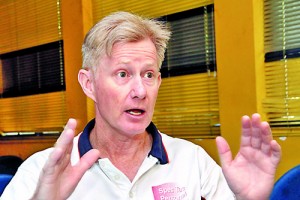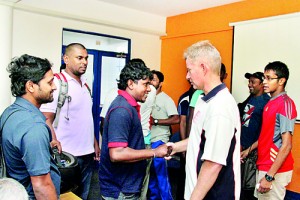A little nudge to make a change!
Adrian McInman is admonishing a group of fully grown men on their sleeping habits. “Eight hours gentlemen,” he says sternly. “I asked you to

Adrian McInman:Master of motivation. Pix by Indika Handuwala
get 8 hours of sleep and only three of you managed to do it.” The grown men in question, a group of strapping young swimming coaches, look at him sheepishly. He laughs about it later; “three is a step up from the first time I asked that question to be honest. I just didn’t want them to get too cocky.”
Adrian, a ruddy faced Australian-turned-American is in Colombo for a week of courses for sports and business professionals. The session we meet at is one he’s conducting for the Sri Lanka Aquatic Sports Union. He has already conducted sessions for these coaches when we meet, knowing that any change must come from the top. “You are more than a technician of swimming,” he tells them,“You are a father, a friend, physician and motivator. You want your swimmers to do well? First they must be in the right state of mind. For that they must be able to communicate with you.”
Adrian is here as part of an Asian tour of sorts; he was in Jaipur before this and hopes to conduct sessions in Manila next. These programmes are conducted completely free of charge and he covers airfare and other expenses out of his own pocket. “I enjoy it,” he says simply.
As founder of Happier Horizons, a personal training organisation he runs from New York, Adrian has been in the field of psychology and ‘happiness’ for many years. He worked as a researcher and psychologist in Australia for 12 years before moving to New York with his wife. As his qualifications from Down Under would have had to be supplemented with further US qualifications if he wanted to continue in the same field Adrian decided to change track and Happier Horizons was established and later trademarked in 2009.

At a session with the swimming coaches
Adrian holds seven university qualifications from five universities in Australia and New Zealand, including a Master of Psychology from James Cook University. It was time volunteering and speaking to those living with HIV, substance abuse and juvenile offenders that inspired him to pursue the field of personal development. The encouraging words of Dr. Dorothy Ortiz Tulla also left their imprint. In addition to the programmes he implements for Happier Horizons, which is more his bread and butter, he also travels the world working with different groups-the target is 120 organizations in 20 countries by August 2016.
Following his session with the coaches we have a quick chat about his work and interests. His self-appointed role in life is to encourage people to get out of their comfort zone and just do it. “It’s not easy, so I have to find creative ways to do it,” he explains. “At the end of the day it’s about a person choosing to make a change, it’s as simple as that.”
Humans rarely change of their own volition in his opinion, but they can be motivated to do so. “The most difficult thing for a person to do is make a habit of doing simple things over and over again.” It’s got something to do with an inherent fear of change, not matter how petty and minute that change may be. As he has already explained to his audience earlier ‘intelligent’ doesn’t always mean ‘good judgment’. “Knowledge does not predict behaviour,” he tells us. “We know that smoking is bad for us, but sometimes even a second heart attack isn’t enough to get us to quit smoking.”
With Happier Horizons Adrian has also discovered that ‘happiness’ is only as potent as the will of the person embracing it. At the session, he asks people to rate their social interactions. Studies have found that those with richer, more fulfilling social relationships are often found to be happier, he notes. Those who talk about their problems have been observed to have better health too. “Even better, it costs nothing!”
We move on to the topic of ‘stress’, or the lack of stress. The word is one we’ve socialised into becoming acceptable, notes Adrian. “I was speaking to a group of kids the other day and asked them what stress was. None of them really knew what it meant.” The complaint ‘I’m stressed’ is what we use to project our fear of not being able to cope and the only way to get over it is simply to accept it as fear and take action, he advises. “Until you stop blaming ‘stress’ you can’t change anything. The most important thing is to perceive the situation differently and change what you do. It’s not particularly difficult once you’ve made the choice-you just need a bit of courage.”


